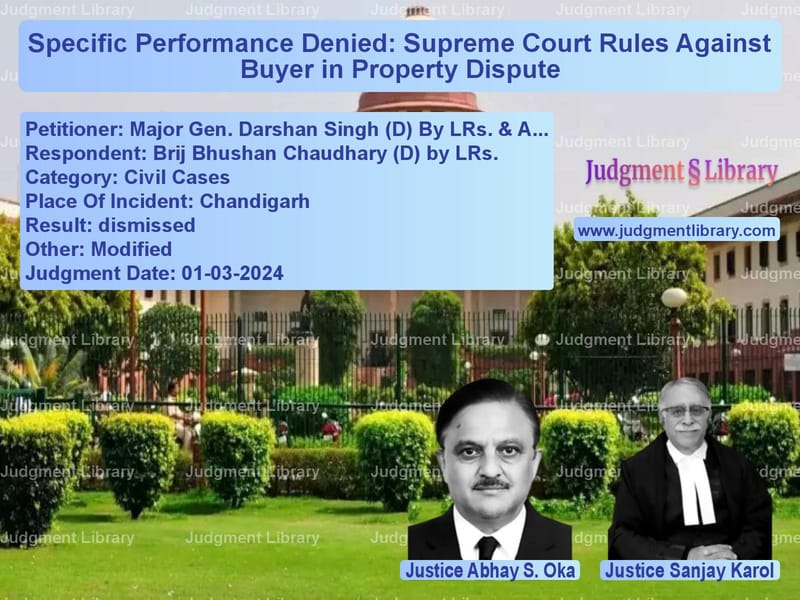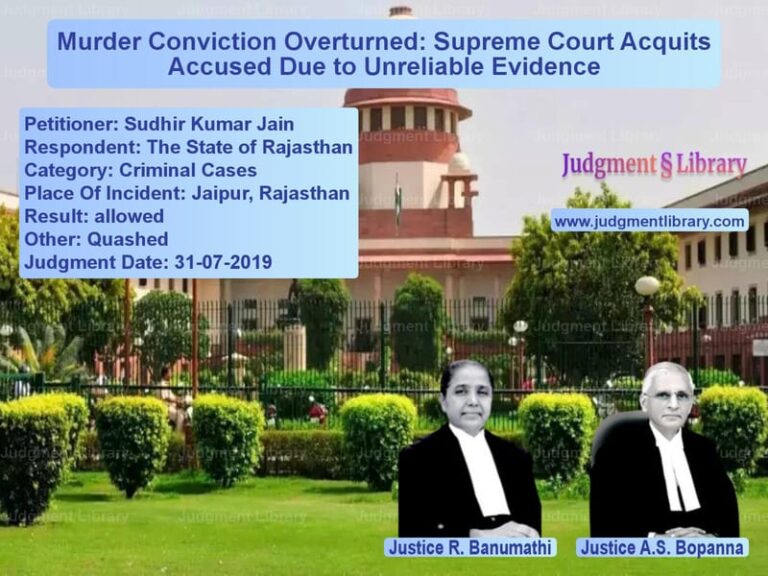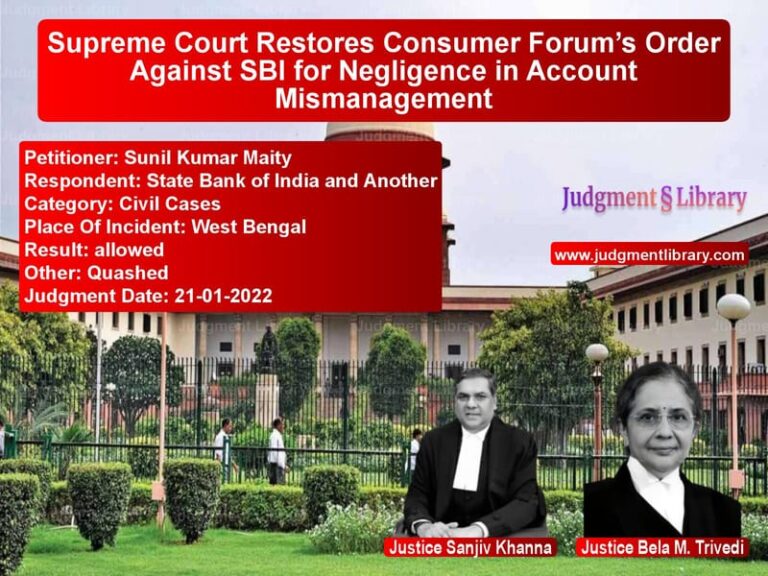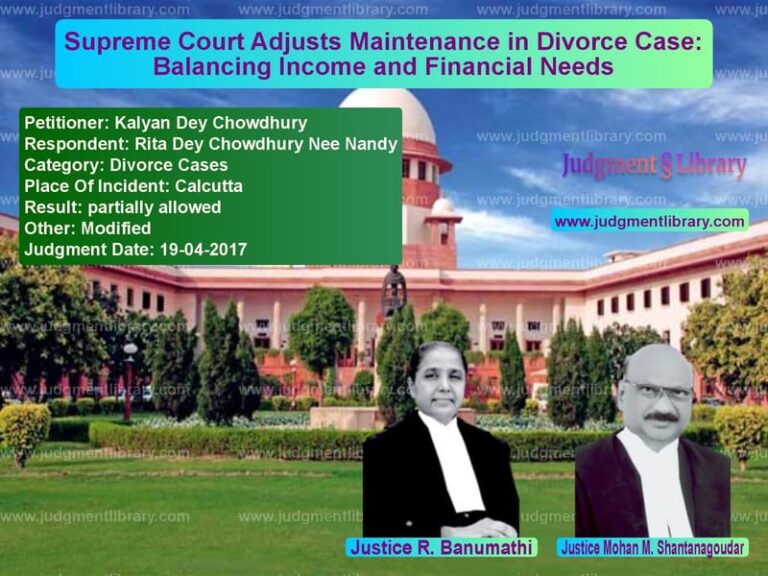Specific Performance Denied: Supreme Court Rules Against Buyer in Property Dispute
The Supreme Court of India has delivered a significant judgment in the case of Major Gen. Darshan Singh (D) By LRs. & Anr. vs. Brij Bhushan Chaudhary (D) By LRs., dealing with the enforcement of an agreement for sale and the discretionary nature of specific performance under the Specific Relief Act, 1963. The case highlights the importance of transparency in contractual dealings and the court’s role in granting equitable relief.
Background of the Case
The dispute arose from an agreement executed on January 16, 1980, between the defendant, Brij Bhushan Chaudhary, and the plaintiff, Major Gen. Darshan Singh. The agreement pertained to the sale of a residential property in Chandigarh, measuring 2,438 square yards, for a total consideration of ₹3,50,000. The plaintiff paid ₹30,000 as earnest money, with the remaining amount to be paid before April 30, 1980.
The agreement included a crucial clause stating that in case of non-compliance by the seller, the plaintiff would only be entitled to a refund of the earnest money along with damages of ₹10,000, but no right to seek specific performance of the contract.
Key Issues Considered by the Supreme Court
- Was the plaintiff entitled to seek specific performance despite the contract limiting his remedies?
- Did the plaintiff demonstrate readiness and willingness to perform his part of the contract?
- Was the property an Hindu Undivided Family (HUF) property, and if so, could it be sold without the consent of all co-sharers?
- Did the plaintiff suppress material facts in the lawsuit?
- Did the plaintiff take possession of the property as claimed?
Arguments by the Petitioner (Plaintiff)
The plaintiffs contended that:
- The agreement initially fixed the price at ₹3,50,000, but subsequent negotiations reduced it to ₹2,90,000.
- They were put in possession of the property after the execution of the draft sale deed on March 18, 1980.
- The seller unjustifiably backed out of the agreement due to an increase in property prices.
- They purchased the necessary stamp papers and called upon the defendant to execute the sale deed, but he failed to appear before the sub-registrar.
- The specific performance of the contract should be granted as they had always been ready and willing to fulfill their obligations.
Arguments by the Respondent (Defendant)
The defendant, on the other hand, argued:
- The suit property was HUF property, and the agreement was executed without the consent of other family members.
- The plaintiffs were aware that the property was jointly owned, yet they falsely claimed otherwise.
- The agreement explicitly stated that the plaintiff could only claim ₹30,000 as a refund and ₹10,000 as damages in case of non-performance.
- The claim that the plaintiffs had taken possession of the property was false and unsubstantiated.
Supreme Court’s Key Observations
The Supreme Court, after analyzing the evidence, noted several contradictions and inconsistencies in the plaintiff’s case:
“The suit agreement does not refer to the defendant’s status as the Karta of the family. However, in the draft sale deed dated 18th March 1980 relied upon by the plaintiffs, the defendant was described as a vendor representing HUF as its Karta.”
The Court found that the plaintiffs suppressed material facts regarding the property’s ownership and continued to claim that the property belonged solely to the defendant, despite knowing it was HUF property.
“In the written statement, the defendant specifically pleaded that the suit property was HUF property. However, in the plaintiffs’ replication, they denied this fact. Yet, during cross-examination, the first plaintiff admitted that the suit property was indeed HUF property.”
Discrepancies in Plaintiff’s Case
- The plaintiff initially claimed that the property price was reduced to ₹2,90,000 but later abandoned this argument in cross-examination.
- The plaintiff alleged that he was given possession, but during cross-examination, he admitted that he had never actually taken possession.
- The agreement clearly stated that the plaintiff had no right to seek specific performance, yet he filed a suit for the same.
Final Judgment
The Supreme Court ruled against the plaintiff, denying the relief of specific performance and upholding the lower court’s decision. The Court held:
“The relief of specific performance is discretionary and equitable. Considering the plaintiffs’ conduct of making false and/or incorrect statements in the plaint, which were very material, we hold that the plaintiffs are disentitled to relief of specific performance.”
However, the Court modified the damages awarded, directing that the plaintiffs receive the previously awarded ₹40,000 with 6% interest per annum from the date of the trial court decree until payment.
Implications of the Judgment
This ruling reinforces key principles regarding specific performance under the law:
- Specific performance is not an absolute right and is subject to judicial discretion.
- Agreements must be honored as per their terms, especially when they explicitly limit remedies.
- Courts will not entertain suits where plaintiffs suppress material facts or misrepresent information.
- Properties held as HUF assets require all co-sharers’ consent before they can be sold.
The verdict sets a strong precedent that contracts should be upheld as per their terms, and plaintiffs seeking specific performance must come with clean hands.
Petitioner Name: Major Gen. Darshan Singh (D) By LRs. & Anr..Respondent Name: Brij Bhushan Chaudhary (D) by LRs..Judgment By: Justice Abhay S. Oka, Justice Sanjay Karol.Place Of Incident: Chandigarh.Judgment Date: 01-03-2024.
Don’t miss out on the full details! Download the complete judgment in PDF format below and gain valuable insights instantly!
Download Judgment: major-gen.-darshan-s-vs-brij-bhushan-chaudha-supreme-court-of-india-judgment-dated-01-03-2024.pdf
Directly Download Judgment: Directly download this Judgment
See all petitions in Property Disputes
See all petitions in Specific Performance
See all petitions in Judgment by Abhay S. Oka
See all petitions in Judgment by Sanjay Karol
See all petitions in dismissed
See all petitions in Modified
See all petitions in supreme court of India judgments March 2024
See all petitions in 2024 judgments
See all posts in Civil Cases Category
See all allowed petitions in Civil Cases Category
See all Dismissed petitions in Civil Cases Category
See all partially allowed petitions in Civil Cases Category







